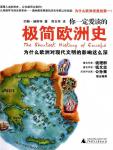Chapter 1 The recommended history is the best hedging secret!
This is a history textbook.
I have always liked historical stories, not history textbooks.But I really like this history textbook, and I envy the author's students for having such a European history textbook.
The author said in the preface: (Australian students) they know too much about Australian history, but too little about European civilization, and they are also part of Europe.These remarks fully demonstrate the author's good intentions, and at the same time, they also reflect how keenly Taiwan has been in the debate over the definition of "national history" over the years.
Today, when a new wave of globalization is in the ascendant, looking back at European history seems to be more inspiring than looking back at Chinese history, and because of the "minimalism" of this book, the feeling is even stronger.
European civilization originated from Greece, passed through the Roman Empire, the Middle Ages to modern Europe.The first impression is fortunate, because Chinese civilization has never been interrupted, and there is no problem of "going around in a circle" (returning to Greece) as the author said in the book.The second feeling is sad, because Chinese civilization has not been interrupted, so there is no opportunity for reflection, and there is no regeneration power like the Renaissance, Reformation, and Scientific Revolution.The third feeling is pride. It turns out that the power of several civilizational changes in Europe came from China: printing, gunpowder, and the compass.The fourth feeling is sad again. The invention of the Chinese "comes back in a circle", but it is the strong guns of the European powers!
As I write this, I solemnly put forward two suggestions: First, when reading this book, it would be of great benefit to have a world map at hand or on the wall. First, you can compare it with the historical map in the book; .Second, keep a reference book such as "Practical History Handbook" at hand, so that you can compare the history of China and Asia in the same period.
The rationale for these two recommendations is simple.You must also read geography when reading history, otherwise it will become a dead memorization. If you compare maps, especially if you can compare ancient and modern maps, history is alive; at the same time, globalization has always been going on, but it used to be very slow, but now it is very fast.Speaking of this, I am deeply looking forward to the author's other course, European History after 1800, and the textbook can also be translated and published.Because that was the important stage of the previous wave of globalization, and there must be more inspiration for today.
Chinese civilization shined brilliantly in the Spring and Autumn Period and the Warring States Period. It was an era of scientific and technological breakthroughs (iron tools) and the release of a large amount of knowledge (disintegration of the scholar class). It was essentially a "globalization" of the vassal states of the Zhou Dynasty. The result was the establishment of Qin Shihuang. unified empire.Europe's prosperity was also the result of technological breakthroughs (the scientific revolution described in this book) and a massive release of knowledge (the introduction of printing, which fueled the religious revolution), which gave imperialism the power to "globalize".
Today's world is facing a similar situation: Internet technology redefines "distance" again, and the Internet also causes a large amount of knowledge to be released. Facing this once-in-a-century or even once-in-a-lifetime era, how lucky we are.
However, the other side of opportunity is "risk".Facing the ever-changing era, there is no precedent for reference. Everyone is crossing the river by feeling the stones. History, at this time, comes in handy.We can learn from history what mistakes our predecessors made in similar situations in the past, so as to avoid them.
We're lucky to have such a "minimalist" hedging book, aren't we?

